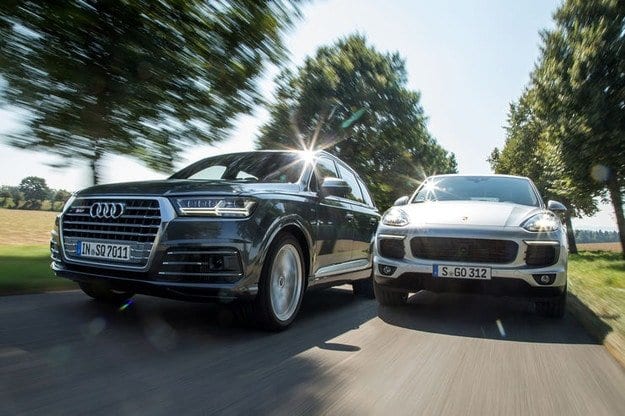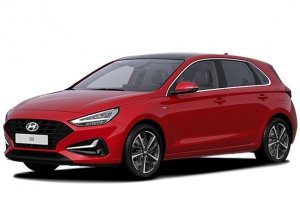
Test drive Audi SQ7, Porsche Cayenne S Diesel: brothers in arms
Content

Two giants with monstrous V8 diesel engines collide with each other
It's no secret that the 4,2-liter diesel engine purring under the hood of the Cayenne S Diesel with 385 hp. taken from the design tables of the company's engineers. Audi. In fact, this is not a problem for the inhabitants of Ingolstadt, who generously provided them with them. Perhaps because they already have another powerful weapon in their arsenal - the new eight-cylinder unit integrated into the SQ7 has more power (435 hp) than the smaller displacement resulting from the use of high-tech technologies such as an electrically driven compressor (according to Audi terminology - EAV). Installed after the intercooler, it compresses the air in the intake ports of the eight-cylinder engine and acts as a buffer before the big cascaded turbochargers take matters into their own hands.
48-volt electrical system
The EAV can draw up to seven kilowatts of power, so Audi engineers decided to use a 48-volt electrical system to power it, thereby reducing the current required to power it. As a bonus, the system also provides a fast system for actively stabilizing the body using an electrically driven stabilizer bar.
But for now, let's focus on technical explanations and start comparing these extreme representatives of the diesel fraternity. For starters, prices. We won't surprise anyone with the big numbers he juggles in this truly luxurious segment. Price lists in Germany start at 90 euros, as in Porsche the base is 2500 euros lower. Not that three percent mattered in this case.
You might be wondering why the leaderboard shows two models with the same values in the cost section. The explanation is very simple: if the base price is added to important additional equipment such as the two test cars, such as larger tires, adaptive chassis, comfortable seats and more power brakes, the main price advantage of the Cayenne S Diesel melts over the SQ7.
Powerful V8 engine in Audi
Most customers will not be too excited by such price fluctuations. The laws of large numbers still apply here - just for statistics, the Audi SQ7 described in these lines, for example, has additional equipment worth 50 euros. In a word - fifty thousand euros!
At this price level, you should expect a lot from these cars, not only in terms of interior comfort and furniture, but also in terms of road dynamics. Can anyone show superiority over an eight-cylinder unit with 850 Nm of torque? The answer is - maybe! The engine of the SQ7 is, to put it mildly, monstrous, omnipotent! All remarks disappear when the power of this machine is turned on, and the 2,5-ton SUV is quickly carried forward. The feel is bright and alien, and while the Porsche Cayenne S Diesel also excels in this regard, it still delivers 50bhp. and 50 Nm less. In addition, it must develop a full 2000 rpm to achieve maximum traction (thanks to the electric compressor, Audi's 900 Nm are available at 1000 rpm). When accelerating to 100 km / h, Audi is ahead by four tenths of a second, and to 140 km / h now increases to one second. The SQ0,4 acceleration time from 7 to 80 km/h is also 120 seconds better when the accelerator pedal is fully depressed.
But these are just numbers on the screen of the measuring system. In real life, driving an SQ7 and sitting in the Cayenne feels like a two-liter diesel SUV. Okay, this might sound a little overdone, but the fact is, it's hard to find precise epithets or analogies for the hard-nosed, brutal power available at the start of the rev scale.
And in terms of fuel consumption, despite the incredible possibilities, the Audi engine remains modest - both the SQ7 and the Cayenne consume an average of about ten liters of fuel in the test. A little more if stepped on, a little less if the right foot is handled carefully. In most cases, the cost figures are comparable: the Porsche consumes a few hundred milliliters more fuel despite the lighter weight.
The Cayenne has more dynamic and dashing proportions, but it's hard to notice when driving. Not because it is heavier, on the contrary, as we have already mentioned, its weight is less, but because the Audi model subjectively feels light. Its 157 kilograms more is dynamically compensated by the so-called Advanced package, which includes body roll stabilization, a sports differential with variable torque distribution to the rear wheels and all-wheel steering. That the Cayenne doesn't perform much worse is due to the PASM system with leveling air suspension. The latter provides him with more comfortable movement, and only at full load does the passage of bumps become a little unconvincing. The Cayenne certainly handles braking better, especially at high speeds. It also has more responsive steering and more driving pleasure. And by turning off the control system, it even allows a controlled supply of the rear. Audi is somewhat more solid, environmentally friendly, but at the same time more neutral in its behavior. However, all this does not change the fact that the competitor from Ingolstadt wins in this confrontation between the brothers in the concern. Fate puts Porsche in second place - an honorable distance from the SQ7.
Text: Heinrich Lingner
Photo: Arturo Rivas
Evaluation
1. Audi – 453 points
As a result, the duel of brothers in the concern Audi won thanks to the larger space, a unique engine and chassis with active stabilization.
2. Porsche – 428 points
With its balanced chassis, precise steering and superb brakes, the Cayenne motivates the sporty driver who doesn't care about huge space.
technical details
| 1 Audi | 2 Porsche | |
|---|---|---|
| Working volume | 3956 cc | 4134 cc |
| Power | 320 kW (435 hp) at 3750 rpm | 283 kW (385 hp) at 3750 rpm |
| Maximum torque | 900 Nm at 1000 rpm | 850 Nm at 2000 rpm |
| Acceleration 0-100 km / h | 4,9 with | 5,3 with |
| Braking distances at a speed of 100 km / h | 35,5 m | 35,1 m |
| full speed | 250 km / h | 252 km / h |
| Average consumption fuel in the test | 10,6 l / 100 km | 10,7 l / 100 km |
| Base Price | 184 011 levov | 176 420 levov |
